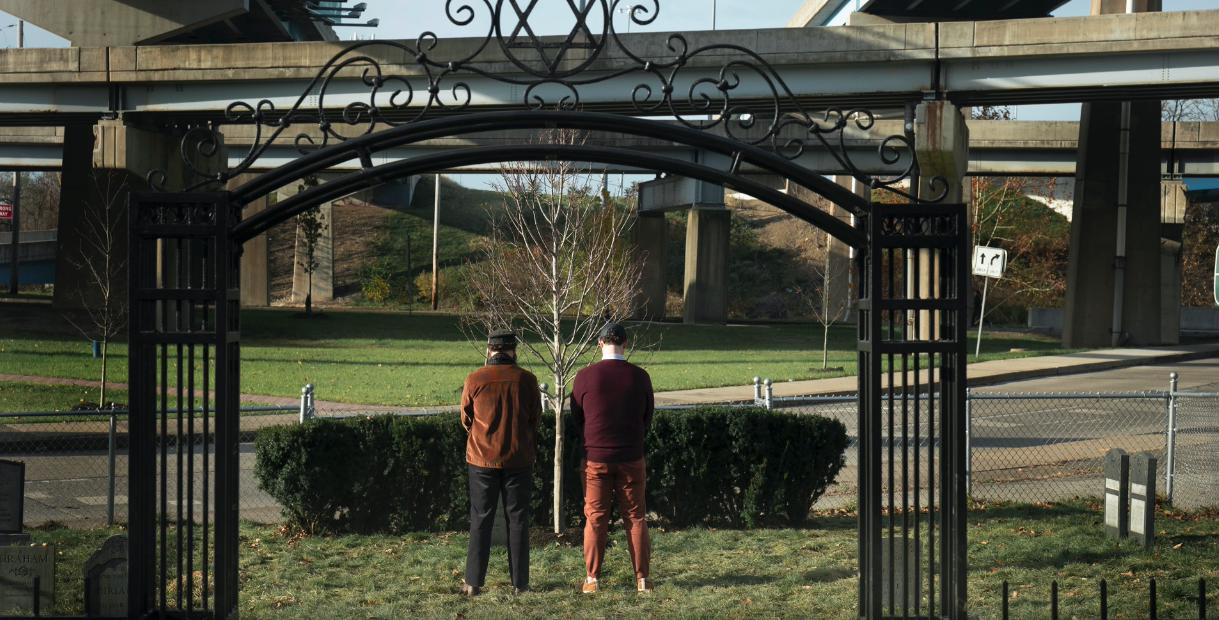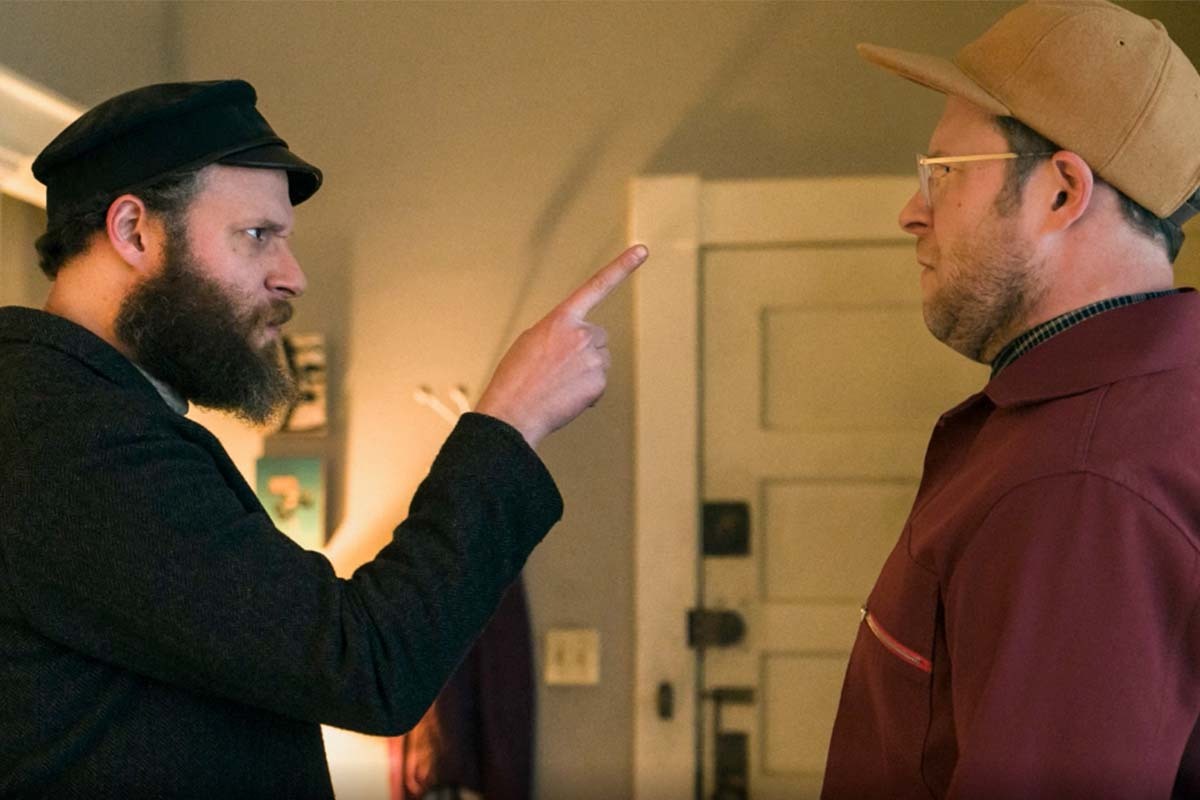Minor spoilers ahead for An American Pickle.
I recently joined a Zoom “birthday party” for my aunt, who’s been suffering from early onset Alzheimer disease for seven years. After all the guests went around re-introducing ourselves and wishing her a happy birthday, two cantors from my aunt’s local Jewish community led us in the Mi Shebeirach, the Jewish prayer for healing. I’m not typically one to pray, but as the slightly-out-of-sync singing began, I found myself mouthing along with the words, remembering them from my years of Hebrew school. By the time the prayer was over, tears were streaming down my face. I felt deeply moved, and even relieved — I hadn’t realized I was carrying so much pain surrounding my aunt, and how badly I needed some formal moment of release.
That’s what I was thinking about when watching a scene towards the end of An American Pickle, when Seth Rogen’s character — well, one of Seth Rogen’s characters — is asked to be the tenth man to complete a minyan in a dark synagogue. Rogen, playing Brooklynite Ben Greenbaum, lowers his head and then shakes it while saying, “I don’t know the words to the prayers, I’m sorry.” A few minutes later, we learn that’s not entirely true. As the elderly Jews around him recite the Mourner’s Kaddish, Ben first chimes in with the “amens” on cue, and eventually starts mouthing along to the Hebrew words.
Ben knows the words to the prayers, and we can imagine where he learned them — perhaps at Hebrew school or Jewish summer camp or some other Jewish institution of his youth — so why did he say he didn’t? Because he’s not religious, or at least he’s been telling himself that for a very long time.
At the center of An American Pickle, HBO Max’s first feature film based on the short story “Sell Out” by Simon Rich, is an immigration story — and an assimilation story. We open on a newly married Jewish couple, Herschel (Rogen) and Sarah Greenbaum (Sarah Snook), leaving their Eastern European town of Schlupsk in 1919 after Cossacks rampaged through and making it to the shores of New York Island where the Statue of Liberty welcomes them into their American dream. We know that Sarah longs to be rich enough one day to purchase her own gravestone, and after she conceives, Herschel declares that their son will be strong, and in 100 years, “the Greenbaums will be powerful, successful, the strongest in the land.”
Of course, that’s when everything goes to shit. On a shift at the pickle factory where he works as a rat-killer, Herschel falls into a giant vat of pickles, the lid is closed over him, the whole factory is condemned, and nobody goes in there for 100 years… until two kids accidentally send their drone through one of its windows. Inside, they push the lid off the pickle vat to discover a perfectly preserved Herschel, tweed vest and all.
After a quick media blitz, Herschel is reconnected with the only living relative that doctors can find: his great-grandson, Ben Greenbaum, who lives in Brooklyn and is the exact same age as the pickled Herschel. Yes, Ben Greenbaum is also played by Seth Rogen, albeit without the beard.
What ensues is not a happy-go-lucky tale of long-lost relatives reunited under the strangest of circumstances, but a rivalry between the two Greenbaums who clearly come from very different worlds. Back at his (gorgeous and obviously completely unrealistic) Brooklyn apartment, Herschel wanders around and wonders out loud why Ben has no pictures of his family on display. Ben, looking clearly uncomfortable, finds the one photo album he has with family photos, including ones of Herschel and Sarah, their son Mort, Mort’s son David and his wife (AKA Ben’s parents), and shots from Ben’s bar mitzvah. Herschel asks where his parents are now, and Ben tells him they died in a car crash. Herschel requests that Ben tell him every detail of his parents’ death so that he can “bear witness to your grief” and they can “bond over our pain,” but Ben brushes it off and suggests they go grab something to eat. Instead, Herschel insists they visit the cemetery where the family is buried. Ben shuts that idea down, so Herschel suggests they go to shul (synagogue) instead, where they can say the Mourner’s Kaddish and properly grieve for the dead.
“I’m not sure that’s something I want to do right now, but I would be happy to walk you over there,” Ben says.
“What is problem?” Herschel asks.
“It’s not a problem. I guess… I understand why you’re a religious person. That makes sense, for someone from your era. But I am not… I’m not very religious.”
“You do not know Mourner’s Kaddish?”
“Not anymore, no.”
“How do you grieve for parents, if you do not say prayer for dead?”
“I’m doing okay,” Ben offers.
Reader, he is not.
The two Greenbaums continue to butt heads from there, participating in an ever-escalating feud after Herschel starts a successful business selling pickles to Brooklyn hipsters who love his “authenticity.” Twitter wars, cancel culture, and angry protestors abound, but the feud I was most taken with was the one going on inside Ben’s own head. It’s one that I can deeply relate to, as an American Jew in the 21st century.
Like Ben, I grew up in a Jewish family, going to Hebrew school at a Conservative synagogue, spending my summers at Jewish summer camp, joining holiday meals with family, and celebrating my bat mitzvah at age 12. And, as we are meant to assume with Ben, my “Jewish life” seemed to stop after leaving home — I wasn’t involved with Jewish groups during college, I no longer went to High Holiday services, and as I moved across the country, I couldn’t even spend holidays with my family. It sounds like an abrupt shift when I spell it out, but in truth, I didn’t think about it much, because, as Ben says, I’m not very religious.
I’m honestly not sure I would have ever connected again with my Jewish identity if it weren’t for a random internship I took in grad school at a Jewish media company, which eventually led to my career (hello, I am the editor of the Jewish culture site you are currently reading). It’s easy to conflate “I’m not really religious” with “I’m not really Jewish,” and that fear — of younger generations turning away from religion — has caused much hand-wringing in the Jewish communal world. It’s a similar kind of hand-wringing Herschel does when asking Ben how the same Jew from those bar mitzvah photos can stand there today and say he’s not interested in going to synagogue or saying a prayer to mourn his family. For many modern American Jews, Ben’s hesitancy makes perfect sense. Like the pickle consumers of Williamsburg, we crave authenticity — we don’t do things just because the Torah says so, or just because our parents say so, or just because a great-grandparent who was brined in pickle juice for 100 years says so.
At the same time, our very stubbornness could be keeping us from finding meaning in traditions that our ancestors kept alive for years.

Even after working in the Jewish professional sphere for over a decade, I still have a good amount of imposter syndrome when it comes to the traditional aspects of Judaism. Yes, I still remember (most of) the words to the Birkat Hamazon from singing it after every summer camp meal for five years, but is it even okay for me to utter a prayer if I don’t really believe in it? Can I close my eyes and say the Shema if I’m not sure there’s a God I am calling out to? I don’t know what the ancient rabbis would say, but I’ve learned to start telling myself yes. I can fast for Yom Kippur one year if I feel like it, even if I’m “not religious,” and I might just have a meaningful experience — or not. I can sing the Aleinu in the shower because, frankly, it’s a very catchy tune. And I can pray along to the Mi Shebeirach with family and friends on a computer screen in the middle of a pandemic that’s left me craving connection wherever I can find it.
None of this means I am any more “religious” than I was 10 years ago, just like I don’t think we are meant to believe that Ben Greenbaum is suddenly religious when he joins in on the Mourner’s Kaddish prayer at the end of the film. He’s still a dude living in Brooklyn who likes to make apps and drink nut milk, and I don’t see him heading to rabbinical school any time soon. But he is more open to the possibility of finding meaning within his family’s traditions. And he’s less likely to bristle at the mere suggestion of using Jewish ritual to mark or mourn the important moments in his life.
The pickle at the heart of An American Pickle (I’m sorry, you know I had to) is not how two men from wildly different generations and upbringings can get along, but how one Jewish American can reconcile his personal beliefs and preferences with the long-standing traditions that have shaped his family. It’s something that American Jews and other Jews in the diaspora have been grappling with for 100 years, and I’d hazard a guess it’s something we’ll continue to grapple with for 100 more. As they say, l‘dor v’dor.
Images via HBO Max.



